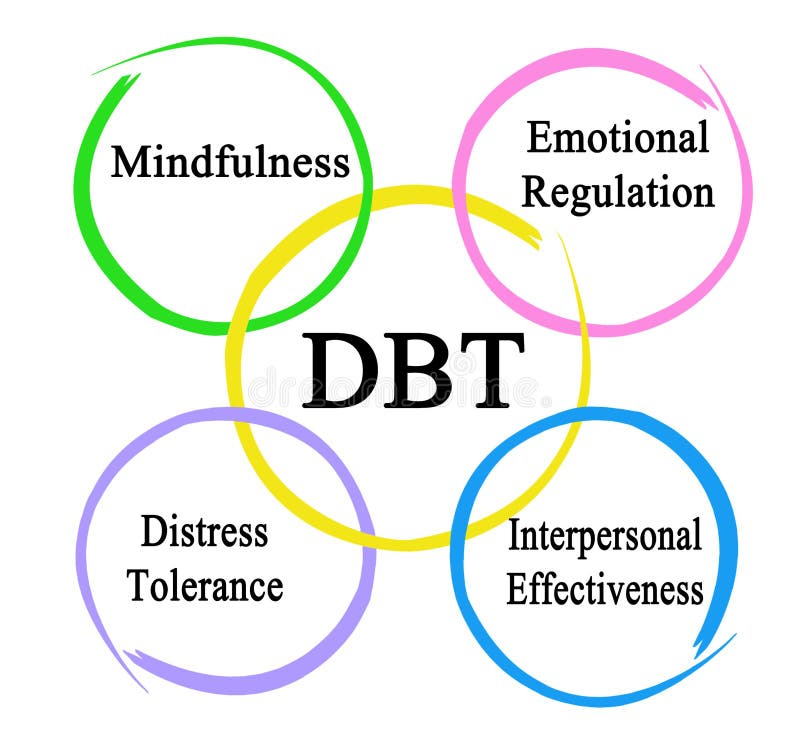Trip to Self-Discovery: DBT London's Compassionate Treatment
Trip to Self-Discovery: DBT London's Compassionate Treatment
Blog Article
Taking Advantage Of the Power of Dialectical Behavior Treatment (DBT) Solutions for Sustainable Psychological Equilibrium and Improved Relationships
In a globe where emotional well-being and keeping healthy and balanced connections are vital elements of a fulfilling life, the utilization of Dialectical Practices Therapy (DBT) services has actually become a sign of wish for numerous people. The evidence-based and structured strategy of DBT uses a path in the direction of lasting emotional equilibrium and boosted communications with others. By focusing in on core principles, people can develop crucial abilities for regulating emotions, boosting interpersonal effectiveness, and fostering mindfulness. Nevertheless, real power of DBT exists not simply in comprehending these principles however in the sensible application of techniques in day-to-day live. As we browse the complexities of human emotions and connections, harnessing the capacity of DBT solutions becomes a transformative journey worth discovering further.

Understanding the Core Concepts of DBT
Dialectical Habits Treatment (DBT) is started upon a collection of core concepts that underpin its therapeutic method to promoting emotional equilibrium and mental health. Mindfulness is an additional core concept of DBT, concentrating on being fully present in the moment without judgment.

Recognition is additionally important to DBT, highlighting the significance of acknowledging and accepting one's experiences and feelings as valid. Through validation, people can find out to navigate their feelings with compassion and understanding, fostering self-acceptance and psychological growth. Lastly, behaviorism plays an essential duty in DBT, highlighting the modification of maladaptive actions with reinforcement and skill-building. By integrating these core concepts into treatment, DBT provides a comprehensive and efficient method to advertising emotional wellness and psychological durability.
Establishing Psychological Regulation Abilities
Psychological regulation skills are essential elements of Dialectical Behavior modification (DBT) that allow individuals to successfully manage their emotions and browse challenging scenarios with durability. These abilities include the ability to identify and recognize one's emotions, tolerate distress, manage intense feelings, and act based on personal values also when faced with emotional turmoil. Establishing psychological law skills includes learning mindfulness techniques to remain present in the minute, understanding the triggers that result in psychological dysregulation, and implementing coping techniques to regulate emotional actions.

Enhancing Interpersonal Effectiveness
Improving communication abilities and cultivating purposeful links with others are essential aspects of creating interpersonal performance within the framework of Dialectical Actions Treatment (DBT) DBT teaches individuals just how to connect effectively, browse interpersonal obstacles, and establish techniques for settling conflicts in a positive manner.
One key element of boosting social performance in DBT is learning to identify and manage emotions in social communications. DBT London. By enhancing psychological awareness, individuals can react to others in an extra compassionate and understanding means. Additionally, DBT stresses the importance of exercising mindfulness in interpersonal relationships, urging people to be present in their communications and totally engage with others
Exercising Mindfulness Techniques
Developing a consistent mindfulness method is important for people going through Dialectical Behavior modification (DBT) to cultivate psychological policy and enhance their social effectiveness. Mindfulness techniques, a core part of DBT, include focusing on the present moment without judgment. Via mindfulness, individuals can come to be more knowledgeable about their thoughts, feelings, and bodily experiences, allowing them to react to circumstances with higher clarity and control.
One secret mindfulness method used in DBT is mindfulness reflection. This practice involves focusing on the breath or a specific object while letting and acknowledging go of any type of disruptive ideas. By including mindfulness reflection right into their daily routine, individuals can educate their minds to remain present and lower reactivity to stress factors.
One more crucial element of exercising mindfulness in DBT is the idea of radical acceptance. Radical approval entails totally embracing truth as it is, also when it is difficult or painful. By accepting the here and now moment without judgment, individuals can lower their Resources suffering and make space for favorable modification.
Using DBT Approaches in Daily Life
Building upon the foundation of mindfulness techniques such as meditation and radical approval, people can incorporate DBT strategies into their everyday lives to foster psychological equilibrium and enhance their interpersonal skills. Additionally, interpersonal performance abilities educated in DBT can help individuals connect their requirements assertively, established limits, and keep healthy and balanced connections. By constantly using these DBT strategies in daily life, individuals can experience sustainable psychological equilibrium and improve their overall health.
Conclusion
.jpg)
Emotional law skills are important elements of Dialectical Actions Therapy (DBT) that enable individuals to properly manage their feelings and navigate difficult circumstances with durability.Through DBT services, people can grow a much deeper awareness of their emotions, identify patterns of habits that look at these guys contribute to psychological distress, and obtain sensible tools to manage their feelings constructively.Developing a constant mindfulness practice is important for people undertaking Dialectical Behavior Therapy (DBT) to cultivate emotional policy and improve their social performance.Structure upon the foundation of mindfulness methods such as reflection and extreme approval, people can integrate DBT techniques right into their day-to-day lives to foster emotional equilibrium and boost their social skills. By comprehending the core concepts of DBT, establishing psychological guideline skills, enhancing interpersonal performance, practicing mindfulness methods, and using DBT strategies in everyday life, people can experience considerable renovations in their overall wellness and partnerships.
Report this page